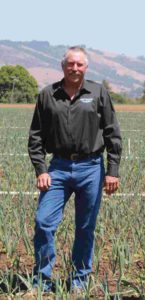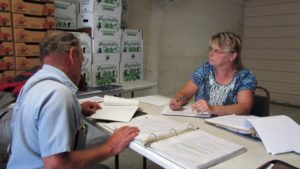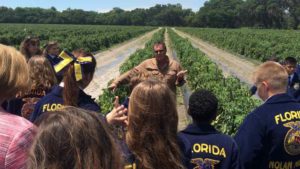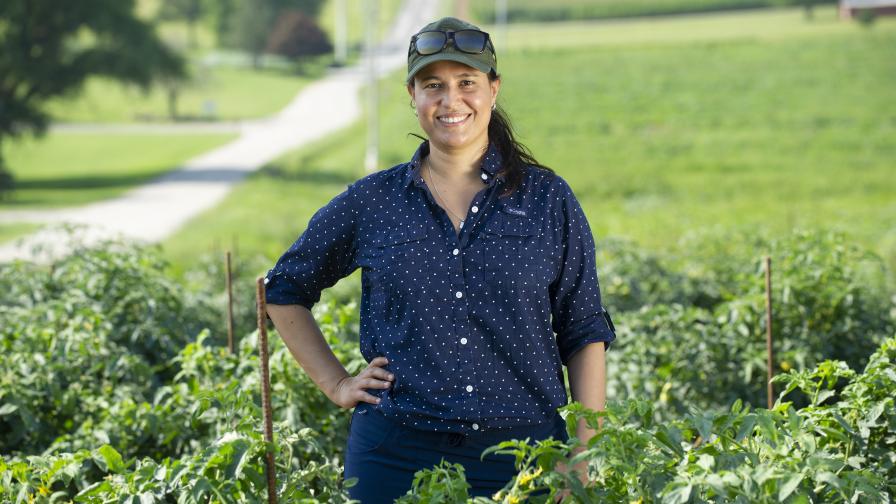The Path To Food Safety
Food safety comes down to people. It is people know-ing what procedures to follow and how to follow them. The Food Safety Modernization Act (FSMA) is the law, and following food safety protocols is a necessary part of doing business.
American Vegetable Grower® magazine connected with a few growers who know the value a food safety plan brings to their business. One grower produces 2,000 acres of organic vegetables, including leafy greens; another has 20 acres of a wide variety of vegetables; and one manages 1,000 acres of tomatoes. Each discusses how they give customers what they want — and then some — and comply with the law, giving you a few pointers along the way.
Lakeside Organic Gardens
Watsonville, CA

Gary Waugaman of Lakeside Organic Gardens. Photo credit: Lakeside Organic Gardens
ON the larger end of the production spectrum, Lakeside Organic Gardens supplies the U.S. and Canada with a variety of vegetables, including a number of leafy greens, on about 2,000 acres.
Gary Waugaman, Food Safety Manager, says the farm is part of the California Leafy Greens Products Handler Marketing Agreement (LGMA), which was formed in 2007. The LGMA was created to protect consumers after the 2006 E. coli outbreak in spinach that caused more than 200 people to get sick and led to three people dying. Food safety practices are at the heart of the organization.
Waugaman says in the years the LGMA has been in existence, it has brought together California leafy greens growers. Specifically for his farm, following the LGMA has resulted in an all-encompassing effort involving the state and the work environment created by the program that helps his farm provide safe and healthy produce, which also contributes to the health of the farm’s bottom line.
Waugaman points out five key aspects of the LGMA Program that help ensure the safety of leafy greens.
1. Involvement with the California Department of Food and Agriculture (CDFA). “The auditors from the CDFA are true third-party auditors. If they observe a serious food safety hazard on your property or a neighbor’s property, an investigation would promptly follow for anyone involved,” Waugaman explains. Corrective actions are mandatory and are verified within a specific timeline, he adds.
2. Unannounced audits. These unannounced or surprise audits mandate consistency in daily harvest operations. “Our harvest teams know they must be compliant at all times, not just on scheduled audit dates,” Waugaman says.
3. The work environment. A positive environment encourages communication, collaboration, and improvements among members, auditors, and supervisors.
“Lakeside Organic Gardens has taken the approach that every audit can provide an opportunity to improve people and processes,” Waugaman says. “I see it as similar to combing your hair. Every time you do it, it can remove a tangle, and this makes a program better.”
4. The LGMA food safety audit (metrics) is all-encompassing, and covers all pertinent elements of food safety. This includes the site, product handling, sanitation, packaging, cooling, and people.
“There are several interviews of employees during audits which prove that the harvest crew members understand and can demonstrate their food safety knowledge. The metrics are the same for large and small growers, and organic or conventional growers,” he adds.
5. “The LGMA audit is a living document and the metrics can be revised and upgraded as new science or research-based information is developed,” Waugaman says. “As a result, this will protect consumers because any new concerns can be incorporated quickly and implemented within a short time frame.”
Meadow View Farm
Kutztown, PA

James Weaver of Meadow View Farm goes over his food safety records with a Pennsylvania Department Of Agriculture’s food safety inspector. Photo credit: Peggy Fogart
Stay positive. That’s food safety advice from James Weaver of Meadow View Farm. Don’t let his acreage number fool you. He has 20 acres of colored heirloom tomatoes, hot and sweet peppers, and eggplant, which could mean he is currently exempt from FSMA, but that is not the case with this farm. Weaver has been GAP-certified for five years so he can sell his produce to Wegmans, a supermarket chain headquartered in New York.
“It has been my philosophy to go over and above what Wegmans is expecting,” he says.
Keep Record Keeping Simple
As record keeping is central to food safety, Weaver advises fellow growers to simplify. For example, he suggests keeping charts in a convenient place so you can record what you need to with a minimum of effort.
“When I look at my manual at the end of the year, I think what I could have done if I didn’t have to [keep extensive records], but making sure I get record keeping right is critical. It was something we had to fit in our schedule.”
Part of that record keeping includes traceback, which meant Weaver had to determine what field each different colored tomato came from. As a result, every box entering the packing shed is stickered.
“A different color sticker is used each day so, for example, tomatoes that were picked on day ‘X’ were put into ‘X’ pack, and ‘X’ colored sticker is placed on the box,” he explains. “We can then go to the picking record to determine where the red color tomatoes came from two days ago, which will tell us which field they came from — thanks to the color-coded stickers. It’s not the latest technology, but it works.”
West Coast Tomato/McClure Family Farms
Palmetto, FL

Gary Reeder of West Coast Tomato/McClure Family Farms in Florida takes learning full circle as he speaks to a young FFA audience on an ag tour. Photo credit: Manatee County Farm Bureau , Dan Wes
The son of a tomato farmer, Gary Reeder has continued the family tradition. Today he is farm manager at farm No. 4 for West Coast Tomato/McClure Family Farms where he produces about 1,000 acres of tomatoes and also serves as the president of the Manatee County Farm Bureau.
The operation sells about 75% of its tomatoes to foodservice providers and restaurant chains. The rest is shipped to the northeastern U.S. and sold in supermarkets. When asked if the farm has to meet different food safety criteria for each customer, Reeder’s short answer is “No.”
The High End Of Food Safety
The farm is certified under GlobalG.A.P. (GlobalGap.org), an organization that has set voluntary standards for the certification of ag products worldwide. The operations the farm works with requested GlobalG.A.P. certification, which, as Reeder says, “ensures that we are on the high end of food safety standards.”
That description, however, may be an understatement for this farm and other tomato growers in Florida. The Sunshine State is noted as being the first to adopt a comprehensive food safety program that includes a mandatory government inspection and audit for tomato handling, production, and packing, according to the Florida Tomato Committee. Good Agricultural Practices and Best Management Practices were adopted as state regulations in 2008.
Reeder says this action stems from when Florida tomatoes were wrongly accused of being the culprit of a Salmonella outbreak that year.
“We want to put out the best quality,” he explains. “We don’t want anyone to get sick. In 2008, the tomato industry in Manatee County was shut down because of a Salmonella scare. We had USDA inspect each box of Florida tomatoes, and it wasn’t our problem. People went out of business because of that and it cost the state tomato industry $250 million because tomatoes from Florida were blamed for [an outbreak caused by] jalapeño peppers from Mexico. We don’t want that to ever happen again.”
The Worker Factor
To help ensure that doesn’t happen again, Reeder says educating employees about food safety practices is critical. Every McClure Family Farms worker has access to handwashing stations, toilets, clean drinking water, and shade for breaks. Workers also receive training at least once a year to make sure they are up to date on hand washing, good sanitary practices, proper trash disposal, and details on what to do if someone is injured in the field.
Reeder says the farm also is conscientious about the use of crop protectants and re-entry intervals, posting signs near fields that have been sprayed.
“America adheres to the highest worker protection standards,” Reeder says. “Many workers come back year after year to harvest the crops because we train them and we take care of them.”
In the end, food safety does come down to people and proper training. Ask yourself: What can I do to ensure the safest produce possible on my farm? We know there is always room for improvement.
5 Pointers To Keep In Mind When Formulating Your Food Safety Plan
JAMES Weaver of Meadowview Farm in Kutztown, PA, offers some tips on what to include when creating a food safety plan.
1. Ensure water for irrigation or for washing produce is safe to use for the intended purpose and have documentation to prove it.
2. Keep an eye on the use of raw manure as fertilizer. As we are awaiting information from FDA on its use, Weaver says to stay on top of what the agency determines the requirements will be.
3. Be proactive with your worker training. Weaver says an inspector came to talk to his crew and asked what should be done if someone was injured. In spite of the language barrier, the crew responded by saying it was necessary to wash the injured area and get a bandage from the first aid kit.
4. Keep records up to date. If you didn’t record it, you didn’t do it. Remember to sign and date each sheet when it is full, too, Weaver recommends.
5. Be prepared for a recall. “If you sell to a supermarket or chain store, the inspectors want to make sure you have the proper system in place in case there is ever a recall, so you have to do a mock recall every year,” he says.










